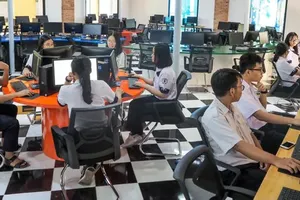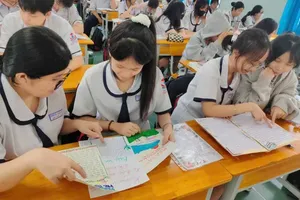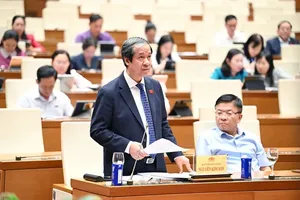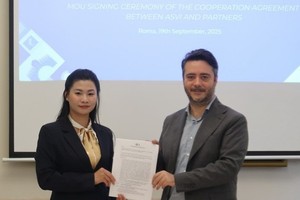
This is also a goal to continue modernizing the organizational and management system, and enhance the quality and efficiency of public institutions. However, according to education experts, mergers must ensure scientific rigor, and effectiveness, and improve overall quality.
At the end of May 2024, a working session was held between the People’s Committee of Tay Ninh Province and a delegation from Ho Chi Minh City University of Education. The delegation arrived at the southern province proposing the establishment of a branch of Ho Chi Minh City University of Education in the province.
During the meeting, representatives from Ho Chi Minh City University of Education proposed establishing the branch by merging with Tay Ninh College of Education. The branch would be responsible for admissions, undergraduate and postgraduate education, short-term training, scientific research, and technology transfer, in line with the functions of Ho Chi Minh City University of Education.
The Tay Ninh Provincial People’s Committee believes that establishing the branch aims to modernize education and training in fields relevant to the province’s human resource needs, aligning with the development planning direction of Tay Ninh Province.
Prior to this, Ho Chi Minh City University of Education also established a branch in the Mekong Delta Province of Long An through the merger with Long An College of Education. In 2024, the branch officially began admitting students.
Similarly, the Quang Nam Provincial People’s Committee has held multiple working sessions with leaders of Da Nang University and proposed that Quang Nam University become a member of Da Nang University. This move aims to elevate the status of Quang Nam University and address enrollment challenges, as the university’s admission rates have been consistently lower than the targets in recent years.
Many universities in Ho Chi Minh City have merged with colleges or transformed them into branches or affiliated institutions. Specifically, in 2021, Ho Chi Minh City University of Agriculture and Forestry and the People’s Committee of Ninh Thuan Province agreed to merge Ninh Thuan College of Education into a branch of Ho Chi Minh City University of Agriculture and Forestry in Ninh Thuan.
In 2019, the Ministry of Education and Training decided to establish a branch of Ho Chi Minh City University of Economics in Vinh Long Province by merging with Vinh Long College of Finance and Economics.
In 2017, the Customs Finance College merged with Ho Chi Minh City University of Finance and Marketing. In 2019, the management authority of An Giang University was transferred from the People’s Committee of An Giang Province to Ho Chi Minh City National University, making it the eighth member university of Ho Chi Minh City National University.
Meanwhile, the vocational education sector is also actively merging institutions. By 2025, public vocational education institutions are expected to decrease by approximately 20 percent compared to 2020. This goal is outlined in the network development plan for vocational education institutions during the 2021-2030 period, with a vision toward 2045, as approved by the Government’s Decision No. 73/QD-TTg on March 10, 2023.
According to this plan, public intermediate vocational schools will decrease by about 40 percent while private vocational education institutions and those with foreign investment will increase by approximately 45 percent. Additionally, the consolidation of regular educational facilities and vocational education centers at the district level will be completed.
According to Principal Vo Van Thang of An Giang University, after merging to become a member of Ho Chi Minh City National University, the university’s difficulties in all aspects have been addressed. From 2019 until now, the university’s admission results have been consistently good, and it has received numerous projects and collaborative programs in education and scientific research.
Additionally, favorable conditions have been created to enhance the qualifications of the teaching staff and attract talented personnel to work at the university.
Sharing the challenges faced during the merger of the Customs Finance College in 2017, former Vice Rector Hua Minh Tuan of Ho Chi Minh City University of Finance and Marketing, explained that aside from policy decisions and legal procedures from governing bodies, various issues needed resolution, including personnel matters, standardization processes, salaries, and infrastructure.
The most significant obstacle was the lack of specific guidelines, making implementation difficult without strong determination and consensus from all parties involved. Fortunately, both institutions were under the Ministry of Finance, which facilitated swift resolution of these challenges. Since the merger, the university’s infrastructure has expanded, the teaching staff has been elevated, and the quality of education continues to improve.
According to Associate Professor Tran Dinh Ly, Vice Rector of Ho Chi Minh City University of Agriculture and Forestry, the excessive establishment of colleges and universities led to an oversupply crisis, making admissions difficult and straining budgets. This period calls for reorganization and reaffirmation of the true value of these institutions. Mergers can yield positive outcomes if done correctly, aligning with the right direction and goals. Conversely, inadequate standards and capacity may lead to closures.
The Ministry of Education and Training’s plan for the network development of higher education and teacher training institutions during the 2021-2030 period with a vision toward 2050 aims to consolidate and restructure universities that do not meet educational standards. The focus is on investing to achieve standards within a 3-5 year time frame, either through mergers or by establishing branches affiliated with reputable higher education institutions.
























